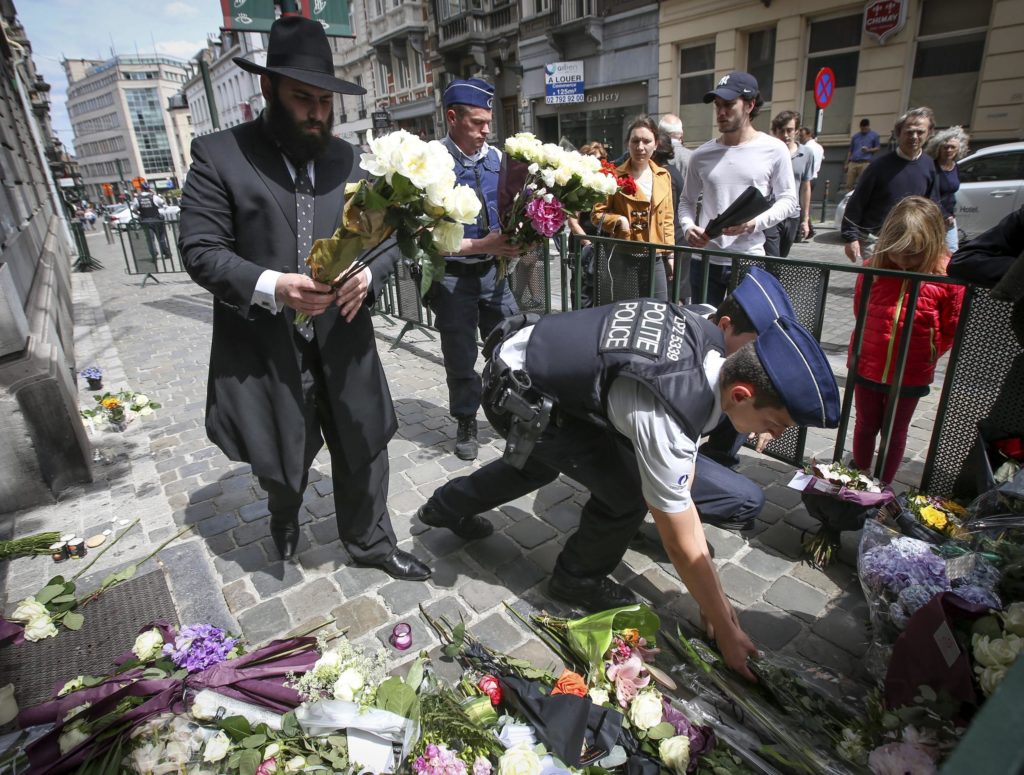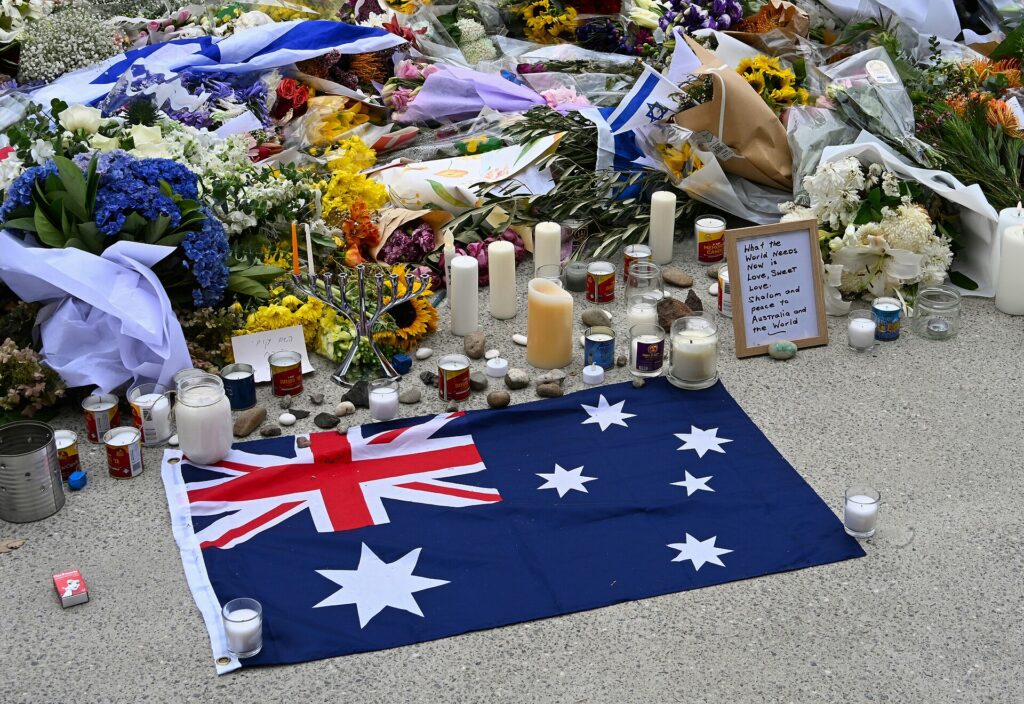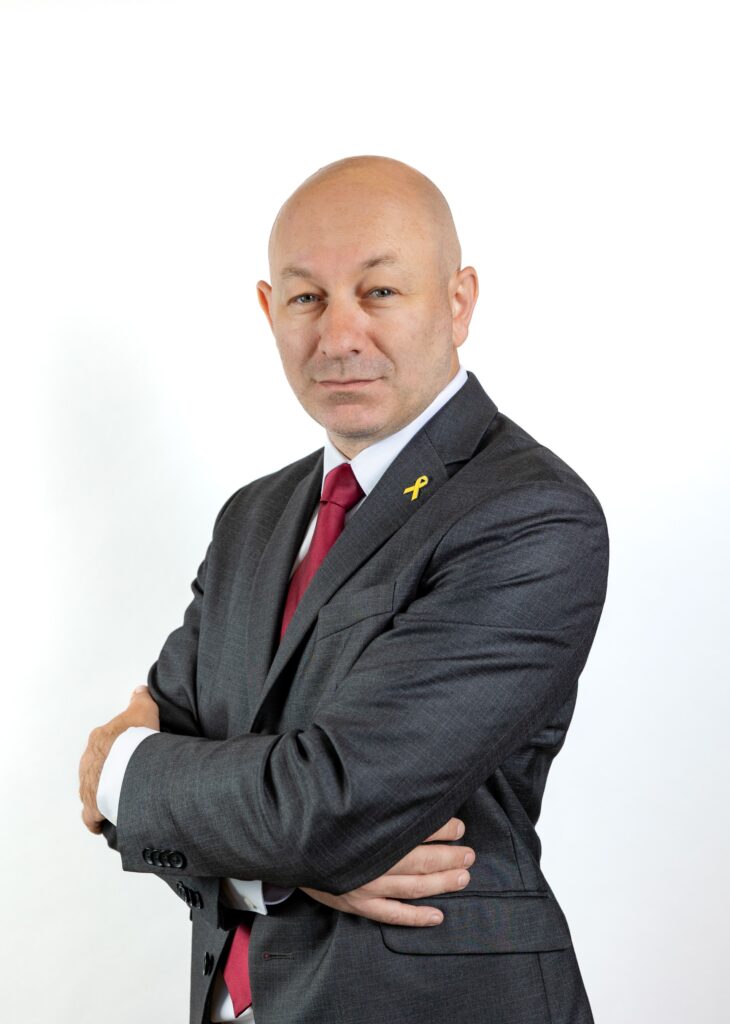UPDATES
Why the Brussels shooting came as no surprise to the Belgian Jewish community
May 27, 2014 | Gabrielle Debinski

The world was stunned on Saturday, May 24, as news poured in of a deadly attack at The Jewish Museum of Belgium in Brussels. A lone gunman stormed into the museum in the city centre and began shooting. Security camera footage and witness concur that the gunman picked out his victims with calm and focus, aiming specifically for the neck and face. The gunmen used an AK-47 to murder two museum staff members, Alexandre Strens and a French female volunteer whose name has not yet been released, and Israeli tourists Miri and Emanuel Riva. Miri, 53, and Emanuel, 54, have two teenage daughters in Israel.
(AIJAC’s statement on the shooting attack is here).
Many world leaders were quick to condemn the brutal attack and express their surprise and outrage. Belgian Prime Minister, Elio Di Rupo, promptly expressed his shock, saying Belgium stands united with the entire Jewish community. Meanwhile, EU foreign policy chief, Catherine Ashton, called for the guilty to be brought to justice, saying, “there must be no impunity for terrorism.”
Yet while the attack certainly bore all the hallmarks of terrorism, it is not enough to just mark it down as some sort of generic form of “terrorism” and leave it at that.
While the specific motives of the attacker is unknown, it seems overwhelmingly likely that antisemitism of some description was a major factor. For the Jews of Belgium, and much of Europe for that matter, this crime is both a symptom and indicator of a trend of mounting antisemitic rhetoric and actions that has been creeping into the continent. Indeed, Belgian Jewish leaders said that the attack “came as no surprise” given the increasing antisemitic atmosphere in their country.
When asked about this spate of violence against Jews in Belgium, Joel Rubinfield, President of the Belgian League Against Anti-Semitism, told the Times of Israel “that track record means that no one thought this couldn’t happen.”
“In fact, most of us knew it could and would, especially in recent years. So I am shocked but not in the least surprised.”
While violence and discrimination against Jews in Belgium has been on the rise, this is the first fatal attack since the 1980’s. In 1979, 13 people were wounded when a grenade was thrown on an El Al plane leaving for Israel at Brussels’ airport. Only three years later in 1982, a gunmen opened fire at Brussels’ largest synagogue, leaving five wounded, two seriously. One of the worst attacks on Belgian Jewry, however, occurred in 1989, when the Jewish Community’s President, Joseph Wybran, was shot and killed by a Moroccan terrorist.
Nonetheless, it is clear that the community was not feeling secure even before the attack at the museum. As historian and Brussels resident Ilana Bet-El explained:
Before World War II, the community numbered about 75,000. Around a third were killed in the Holocaust. After the war, survivors and refugees returned to Belgium, and many others passed through it en route to America, Canada, South America and, later, Israel. Today, the community numbers about 42,000, and is gradually shrinking. Jews don’t feel safe in Belgium, and that’s the emotional background against which Saturday’s horrific attack at the Jewish Museum in Brussels occurred.
The growing trend of antisemitism in Europe as a whole was confirmed by a recent global survey conducted by the Anti Defamation League. The ADL Global 100: An Index of Anti-Semitism surveyed at least 500 adults in each of 102 countries and found that over one quarter held antisemitic views.
The survey was made up of eleven questions expressing traditional antisemitic stereotypes, with the index score for each country reflecting the percentage of adults who answered, “probably true” to a majority of those stereotypes.
It revealed that outside of the Middle East and North Africa, Eastern Europe has the highest index score of 34%, followed by Western Europe where 24% of people hold anti-semitic attitudes, under the survey’s definition.
Belgium scored an index figure of 27%, representing a total number of 2,400,000 individuals harboring antisemitic views out of an adult population of approximately 8,708, 075. In response to the question whether “Jews have too much power in the business world” the equivalent of 43% of the population answered ‘probably true’ while 37% agreed that “Jews still talk too much about what happened to them in the Holocaust.”
Debates have waged throughout the Jewish world about the weight that should be given to the ADL findings. Regardless, it is clear from numerous other information sources that a frightening rise in both antisemitic opinions and anti-Jewish acts has been occurring throughout most of Europe.
Antisemitic leanings have certainly crept into Belgian politics. On January 16 of this year, Lauren Louis, a Belgian lawmaker from the centre-right People’s Party, stood up in parliament and declared “the Holocaust was set up and financed by the pioneers of Zionism” and later performed the ‘quenelle’ salute, the Nazi salute-like greeting popularised by Dieudonné M’bala M’bala, a French comedian with at least convictions relating to his antisemitic rhetoric. Thankfully, the President of Belgium’s parliament, Andre Flahaut, later strongly condemned the remark.
Louis then followed up by trying to organise what he called the “First European congress of dissent”, a conference which was to feature Dieudonne and several other speakers from the French far-right. This was later blocked by the mayor of Anderlecht, the town where the “Congress” was to be held.
Earlier, Karel De Gucht, the European Union’s trade commissioner and a former foreign minister of Belgium, infamously made a series of remarks generally regarded as antisemitic in 2010.
As former top Australian Jewish leader and former native of Belgium, Isi Leibler wrote last year of the situation in that country:
Hatred of Jews is usually but not exclusively manifested as anti-Israelism. The Jewish community has been under increasing pressure and last year, anti- Semitic incidents, including desecration and vandalism of Jewish institutions as well as violence directed against Jews, rose by a steep 30%….A few months ago there was extensive media exposure in Belgium highlighting the inaction and cynicism of the Antwerp police in relation to a violent anti- Semitic incident in which thugs assaulted their neighbors (one of whom was hospitalized), called them “stinking Jews” and threatened them with “finishing what the Nazis started.”
It is not surprising that in a climate in which Jews are treated like pariahs, a large proportion of the community is sadly resigned to the fact that there is no future for a meaningful Jewish life for their children in Belgium.
Increasing numbers, especially younger people, have or are planning to settle in Israel.
Meanwhile, in another apparent sign of the times in Europe, only a few hours after the attack in Brussels, two Jewish brothers were attacked outside a synagogue in Paris and taken to hospital in serious conditions. The two assailants, who at time of publication have not been caught, beat the young men with knuckle-dusters before escaping by foot and on a bicycle.
What Ilana Bet-Il said about the situation in Belgium looks increasingly like it might apply for many of Europe’s Jewish communities:
Jews in Belgium, and in Europe in general, are used to the need to be careful – always. And perhaps the need to leave. They aren’t sitting on packed suitcases, but neither are they living in security.
The shooting at the Jewish Museum will likely move Belgium’s Jewish community that much closer to the exits.
Gabrielle Debinski
Tags: Antisemitism





